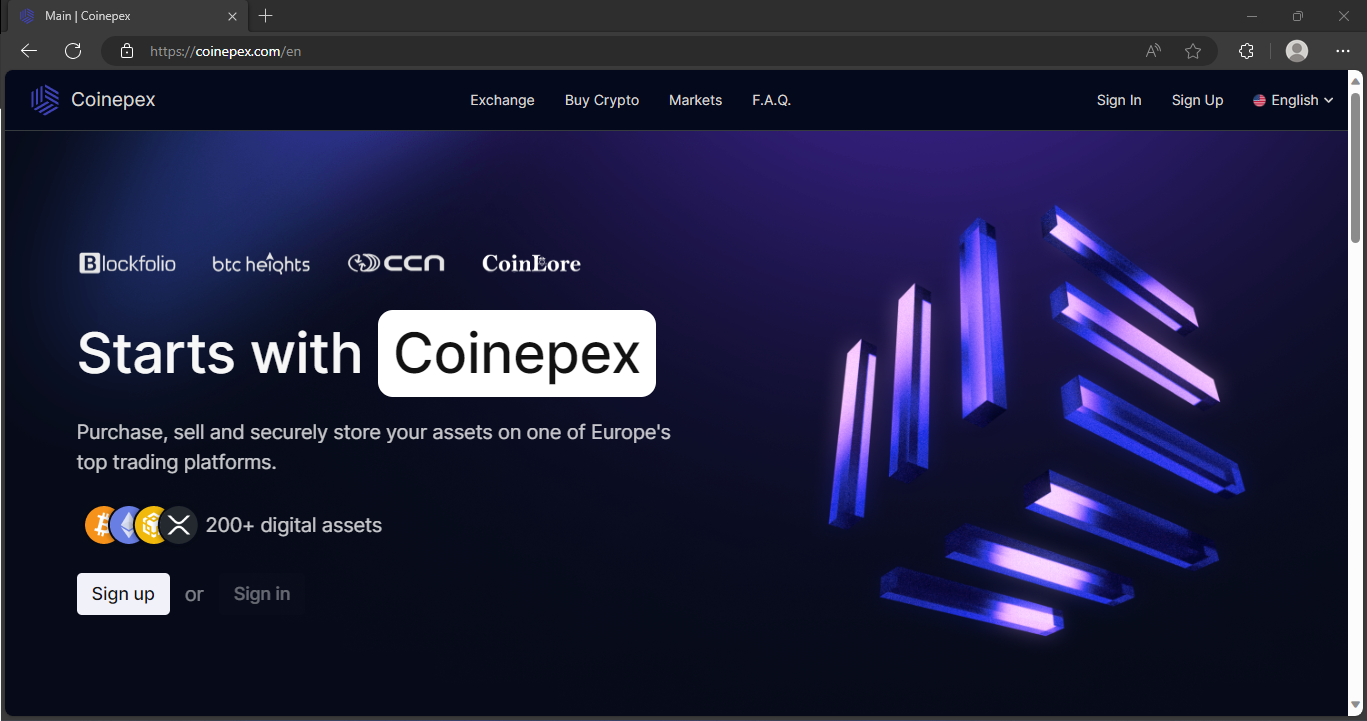Recently, Coinepex.com site surfaced, promoting itself as a place where you can securely keep cryptocurrency and other assets. I managed to gather credible proof that clearly indicates it is, actually, a scam service.
Contrary to the claims of Coinepex.com, they won’t give back your funds. Regardless of the figures displayed in the “member area”, there is no means to take out even a cent. All commitments regarding crypto bonuses are hollow as well.
Coinepex Scam Overview
The key offering that Coinepex strives to provide is a secure and convenient cryptocurrency wallet service. The site promises exchange facilities, tools for handling wallets, transfers, dashboards, and alike functions. In reality, they endeavor to emulate the functionality of a crypto exchange, like Binance or Coinbase. However, it in fact exclusively serves as a cover intended to lull the vigilance.
First and foremost, Coinepex mimics the layout of numerous equivalent pages. There are quite a few examples, like Bitdexpay, Savetrex or Owbitc. They are completely undistinguishable in terms of visual elements, with small discrepancies in the website header. Other specific elements, and at times even crypto wallet addresses, are the same. Most likely, all these fraudulent websites are managed by a single group of scoundrels.
Cryptocurrency Scam Summary
| Website | Coinepex.com |
| Hosting | AS13335 Cloudflare, Inc. United States, San Francisco |
| IP Address | 104.21.22.161 |
| Threat Type | Scam/Fraud |
| Scam Type | Fraudulent offers of cryptocurrency services |
How the Coinepex Scam Works?
Coinepex is yet another webpage within a vast network of linked crypto scam webpages. The administrators employ various brand titles and sites, like Coinepex.com, to ensnare victims. Nonetheless, these deceptive websites share identical website designs, terms of service, and About content. This reveals their sources as a part of the same scam network, which promotes the similar mode of fraud under diverse covers. The scammers just copy the same fraudulent site under diverse names to mislead users into assuming they are participating in a new venture. However, in actuality, it’s the same group of scammers orchestrating the deceptive pledges and efforts to grab deposited funds. The managers skillfully employ psychological maneuvers and captivating offers to execute their unscrupulous plans.
Step 1: Spreading
To begin the deceptive scheme, criminals create and fill accounts on well-liked social media platforms. They generally aim at Facebook, Instagram, Twitter, and TikTok. Subsequently, the promotional campaign begins. Utilizing bots and sponsored promotions (when feasible), scam actors increase the exposure of their deceptive activities to potential victims. This tactic allows them to create a broad net and engage with their targeted audience. This audience typically consists of cryptocurrency enthusiastic individuals seeking prospects to generate profits.
Users get an encouragement to register, attracted by the assurance of obtaining crypto benefits valued at thousands of dollars, all for free. To increase the attractiveness of the offer, fake suggestions of cooperation with a celebrity are incorporated. As you may guess, these assertions are entirely baseless.
Step 2: Gaining Traffic
People who demonstrate interest go to Coinepex.com via links present in advertisements or bot-generated posts. The webpage employs captivating visuals, design features that appear legitimate, and assertions of holding a legitimate license, all designed to present an initial image of reliability.
Step 3: Data Gathering
To redeem their prizes, users are required to deliberately sign up on Coinepex and get prompts to provide sensitive and private data during the enrollment procedure. This includes linking their cryptocurrency wallets, sharing email addresses, supplying phone numbers, furnishing identification papers, and the like.
Step 4: Requesting funds
Once registered, users witness considerable amounts of cryptocurrency, valued at thousands of dollars, within their Coinepex wallets. Nonetheless, as it usually happens with such bonuses, you cannot withdraw them ahead of making a deposit. Usually, a funds transfer of $100 is asked to withdraw the sign-up bonus. This prerequisite serves as the enticement that ultimately culminates to the money loss.
Step 5: Disappear
The moment the deposit is submitted, the fraudsters cease all contact. They proceed to restrict users, delete accounts, and disappear with both the transferred capital and essential personal details. The phony rewards remain perpetually uncredited, as they lack genuine existence. They act purely as a deceptive ploy. This method forms the foundation for the deceivers’ capacity to trick victims and embezzle hard-earned money through their double-dealing online crypto scam.
Signs of Scam
I gathered several facts that point at the scammy nature of the Coinepex.com. Actually, there are a lot of scams that fall under the same points, so they are pretty much universal.
- Cryptocurrency-Only Transactions. Coinepex.com insists on cryptocurrency payments exclusively, excluding conventional methods like bank transfers. This strategy ensures anonymity for the scam and eliminates any possibility of seeking refunds.
- Dubious Company Credentials. Coinepex arouses suspicion by failing to provide critical information about ownership, location, and legal registration. The lack of valid contact details and the recent creation of domain and social media profiles cast doubt on its legitimacy.
- Baseless Hype Generation. Coinepex resorts to fabricating non-existent achievements, such as contracts with Coinbase or endorsements from Elon Musk, to manipulate emotions and enhance the perception of potential returns, enticing victims to invest more.
- Fictitious Celebrity Association. Coinepex employs a deceptive tactic by falsely associating itself with well-known figures like Elon Musk, Jeff Bezos, Mr. Beast, and Mark Zuckerberg. Additionally, the scam falsely claims partnerships with established entities like Coinbase, Binance, or MetaMask to bolster its false credibility.
- Potential Ponzi-Like Model. The scam operates on a pyramid-style referral system disseminated through social media, benefiting only initial participants and relying on later investments to sustain the illusion.
- Unrealistic Profit Promises. Promising improbable returns of 50-100-200%, Coinepex capitalizes on the desire for high profits. However, the tumultuous nature of the cryptocurrency market renders such gains implausible, solidifying Coinepex.com as a definite scam.
What Should I do as a Victim?
If you had to deal with Coinepex site and fell victim to that scam, there are still some steps to take. They will make further scam attempts harder, and also boost the knowledge about that scam among folks.
- Secure Your Actions. Begin by promptly reporting the scam to appropriate local authorities tasked with handling financial fraud. Notify wallet providers and engage with social networks’ technical support teams. By taking these measures, you contribute to making the scammers’ operations significantly more difficult.
- Expand Awareness. Extend your efforts by sharing the scam information with your close friends. This action has a parallel effect to reporting to the authorities, as disseminating details about fraudulent crypto services reduces the potential victims they can deceive.
- Gather Evidence. Preserve comprehensive evidence by capturing screenshots and saving all pertinent data linked to the deceptive website. Collect the URL, screenshots of the main page, login interface, end-user license agreement (EULA), account top-up menu, and wallet addresses. These materials could prove invaluable for authorities in their pursuit of the scammers.
- Explore Refund Possibilities. While cryptocurrency payments generally fall outside the scope of refund policies within most banks, it’s worth investigating the potential for a refund in specific circumstances. Maintain optimism until you definitively confirm the loss.
- Convert Mistake into Wisdom. Transform your financial setback into a valuable learning experience. Treat your loss as an investment in understanding the tactics of crypto scam sites. Familiarize yourself with their key characteristics, how they lure individuals, and the grandiose promises they make. Armed with this knowledge, you’ll be well-equipped to recognize and avoid falling into future traps without incurring further losses.
Scan your system for possible malware infections
Beware of cross scams! Scam actors can use your trust to make you download some stuff or interact with certain documents. It may be a trap that installs malware to your system. There are no moral barriers or limits for these scoundrels.
Throughout the course of the fraud, its actors may reach out to you with particular documents. Alternatively, they may offer you to deploy “cryptocurrency wallet applications” or “browser extensions” to streamline access to your cryptocurrency savings. As we previously determined, these rascals have no intention of restoring your funds. So, what can these emails and browser plugins represent? Correct – this is another side of the deceptive plan designed to throw you into deliberately running harmful software onto your system.
Both extensions and attachments attached to emails can act as a carrier for various malicious software. In this scenario, I expect the presence of spyware and stealers among all forms of threats. While it is not obligatory for scammers to distribute malware, the chance is always significant. As previously mentioned, their morality is of no concern, and their reputation is already deeply compromised. They have no scruples to give up and intend to maximize profits.
Remove spyware with Gridinsoft Anti-Malware
We have also been using this software on our systems ever since, and it has always been successful in detecting viruses. It has blocked the most common malicious programs as shown from our tests with the software, and we assure you that it can remove spyware as well as other malware hiding on your computer.
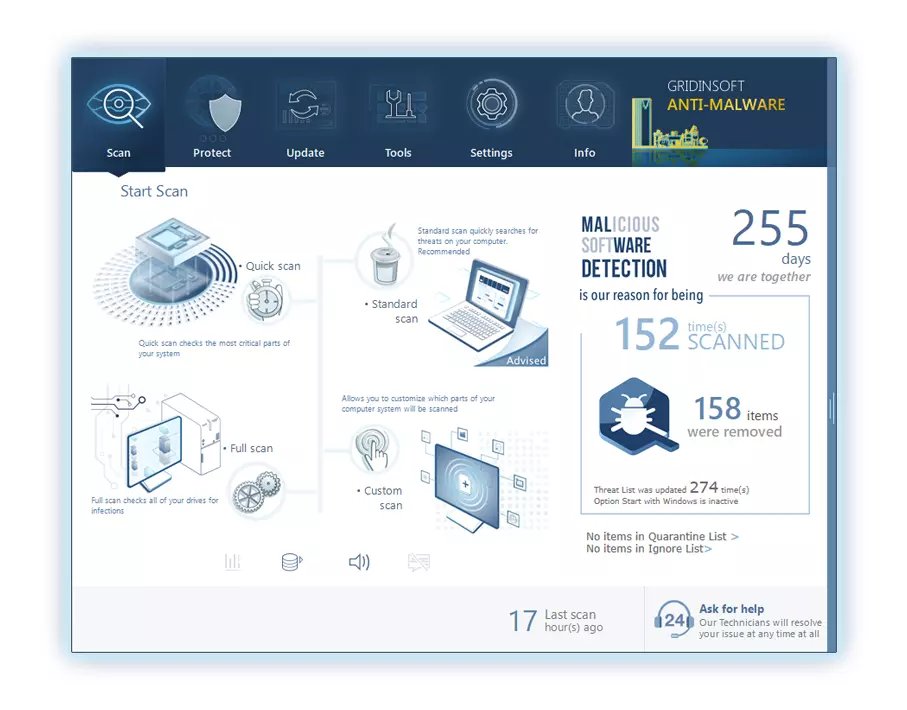
To use Gridinsoft for remove malicious threats, follow the steps below:
1. Begin by downloading Gridinsoft Anti-Malware, accessible via the blue button below or directly from the official website gridinsoft.com.
2.Once the Gridinsoft setup file (setup-gridinsoft-fix.exe) is downloaded, execute it by clicking on the file.
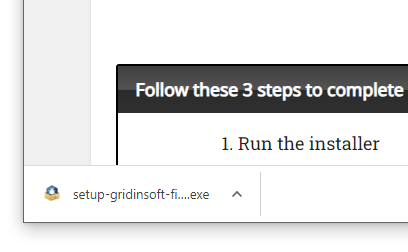
3.Follow the installation setup wizard's instructions diligently.
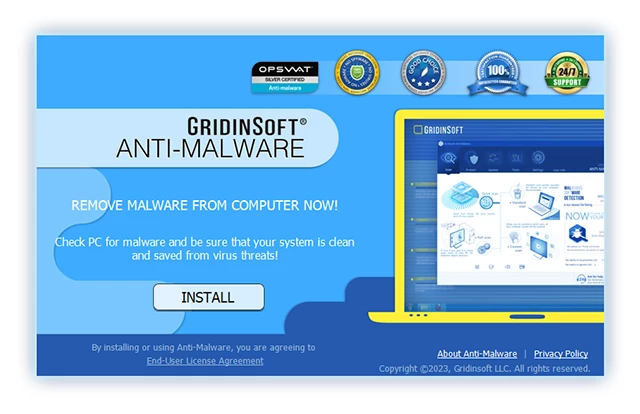
4. Access the "Scan Tab" on the application's start screen and launch a comprehensive "Full Scan" to examine your entire computer. This inclusive scan encompasses the memory, startup items, the registry, services, drivers, and all files, ensuring that it detects malware hidden in all possible locations.
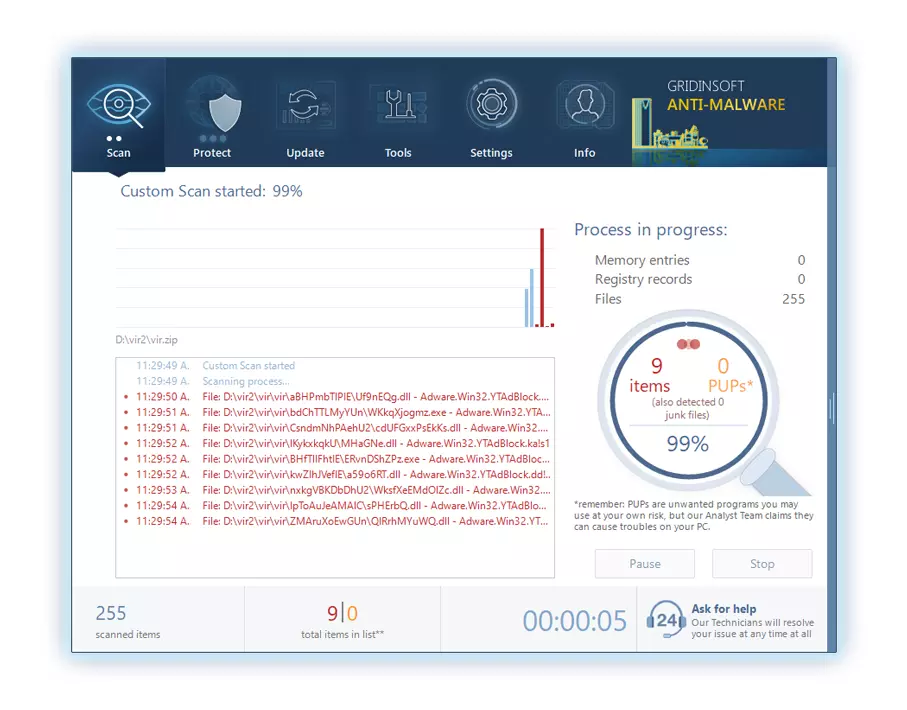
Be patient, as the scan duration depends on the number of files and your computer's hardware capabilities. Use this time to relax or attend to other tasks.
5. Upon completion, Anti-Malware will present a detailed report containing all the detected malicious items and threats on your PC.
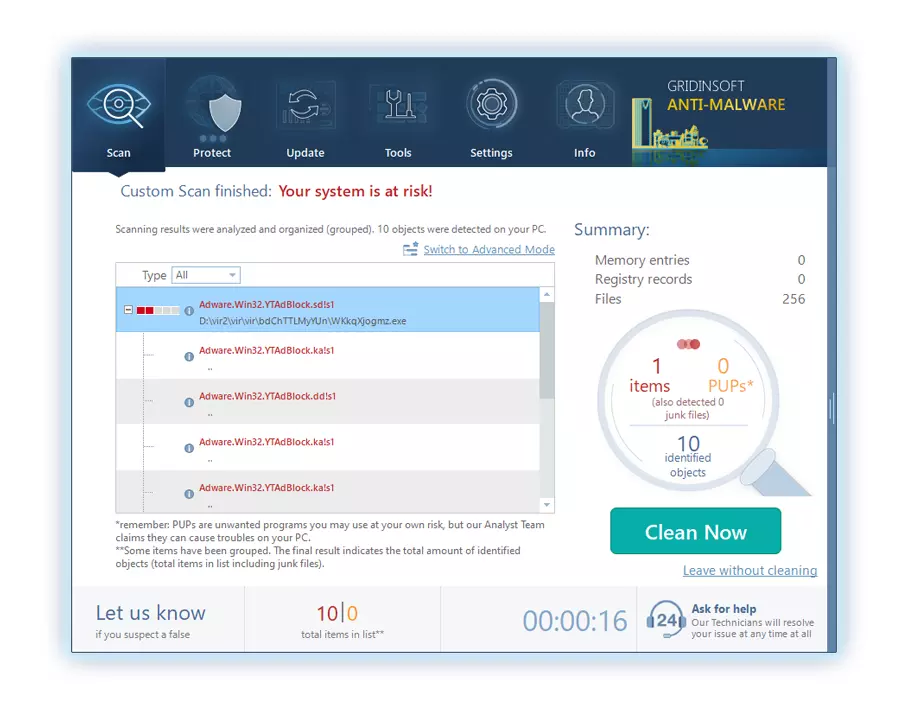
6. Select all the identified items from the report and confidently click the "Clean Now" button. This action will safely remove the malicious files from your computer, transferring them to the secure quarantine zone of the anti-malware program to prevent any further harmful actions.
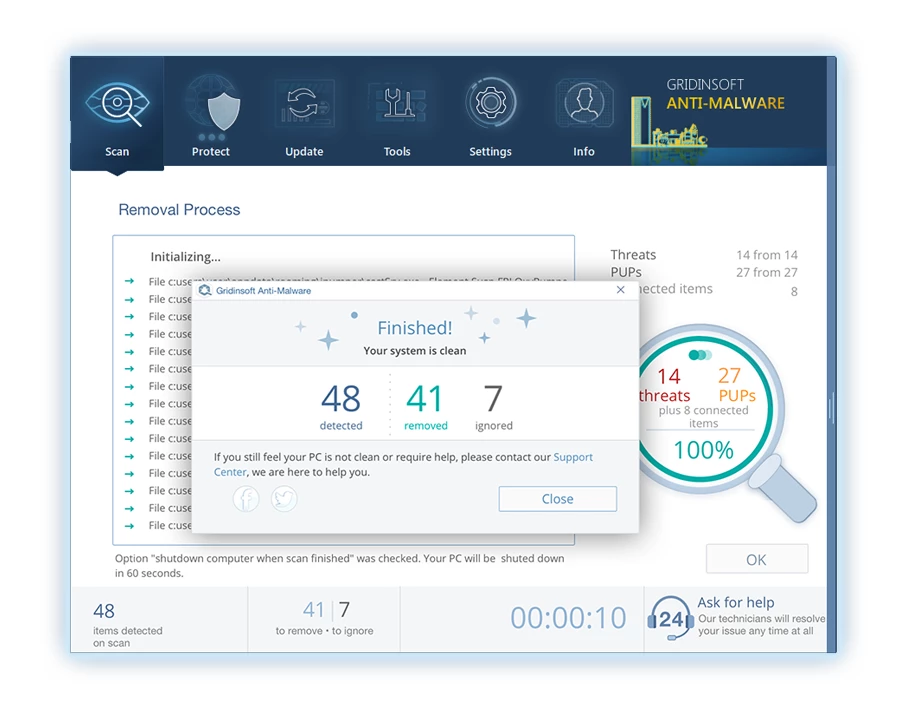
8. If prompted, restart your computer to finalize the full system scan procedure. This step is crucial to ensure thorough removal of any remaining threats. After the restart, Gridinsoft Anti-Malware will open and display a message confirming the completion of the scan.
Remember Gridinsoft offers a 6-day free trial. This means you can take advantage of the trial period at no cost to experience the full benefits of the software and prevent any future malware infections on your system. Embrace this opportunity to fortify your computer's security without any financial commitment.
Trojan Killer for “spyware” removal on locked PC
In situations where it becomes impossible to download antivirus applications directly onto the infected computer due to malware blocking access to websites, an alternative solution is to utilize the Trojan Killer application.
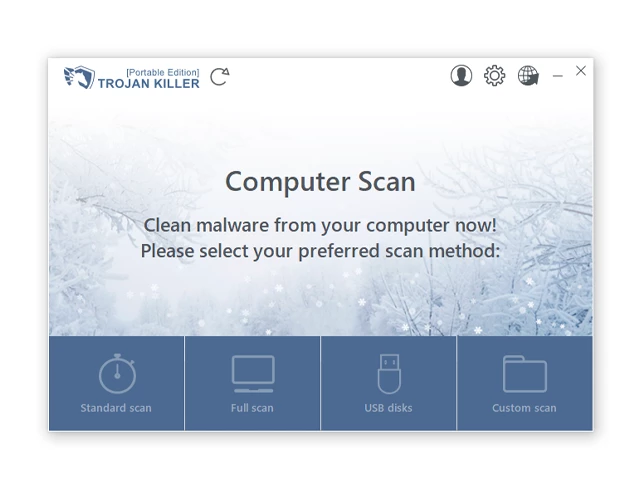
There is a really little number of security tools that are able to be set up on the USB drives, and antiviruses that can do so in most cases require to obtain quite an expensive license. For this instance, I can recommend you to use another solution of GridinSoft - Trojan Killer Portable. It has a 14-days cost-free trial mode that offers the entire features of the paid version. This term will definitely be 100% enough to wipe malware out.
Trojan Killer is a valuable tool in your cybersecurity arsenal, helping you to effectively remove malware from infected computers. Now, we will walk you through the process of using Trojan Killer from a USB flash drive to scan and remove malware on an infected PC. Remember, always obtain permission to scan and remove malware from a computer that you do not own.
Step 1: Download & Install Trojan Killer on a Clean Computer:
1. Go to the official GridinSoft website (gridinsoft.com) and download Trojan Killer to a computer that is not infected.
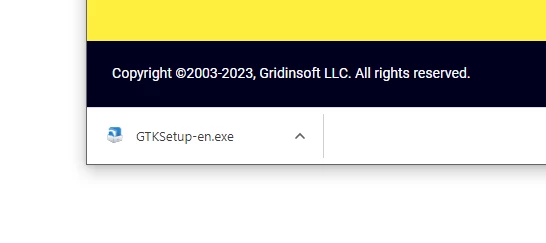
2. Insert a USB flash drive into this computer.
3. Install Trojan Killer to the "removable drive" following the on-screen instructions.
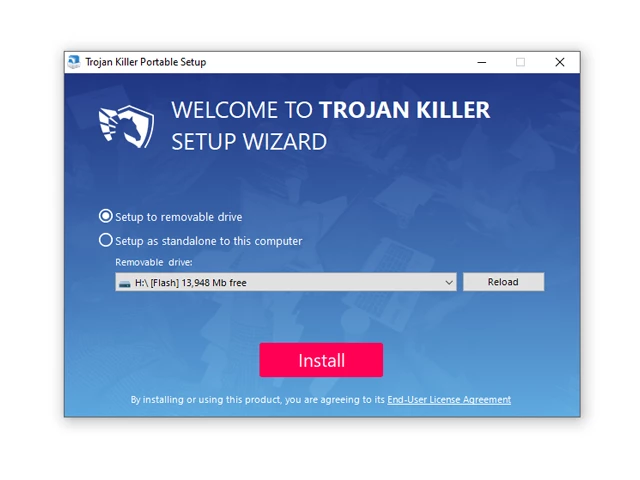
4. Once the installation is complete, launch Trojan Killer.
Step 2: Update Signature Databases:
5. After launching Trojan Killer, ensure that your computer is connected to the Internet.
6. Click "Update" icon to download the latest signature databases, which will ensure the tool can detect the most recent threats.
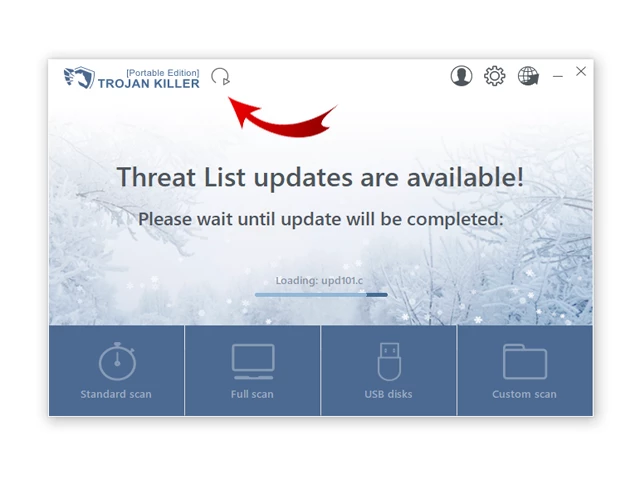
Step 3: Scan the Infected PC:
7. Safely eject the USB flash drive from the clean computer.
8. Boot the infected computer to the Safe Mode.
9. Insert the USB flash drive.
10. Run tk.exe
11. Once the program is open, click on "Full Scan" to begin the malware scanning process.
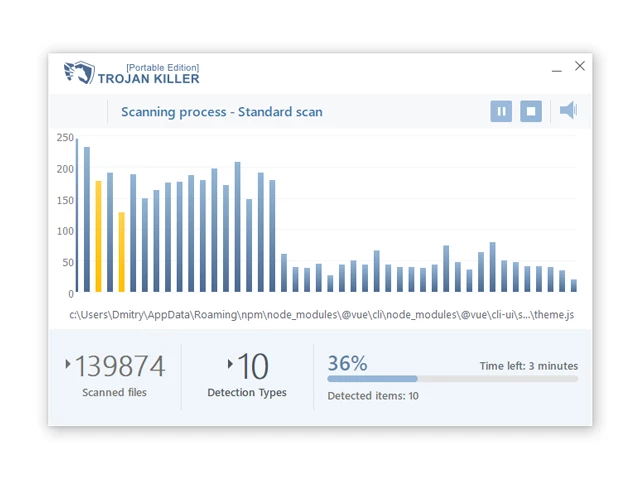
Step 4: Remove Found Threats:
12. After the scan is complete, Trojan Killer will display a list of detected threats.
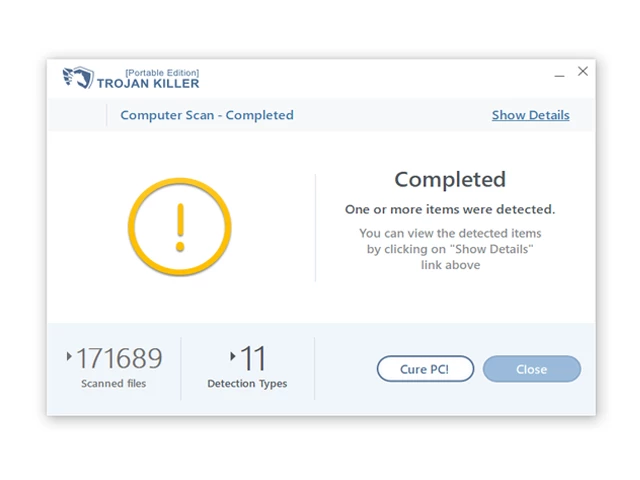
13. Click on "Cure PC!" to remove the identified malware from the infected PC.
14. Follow any additional on-screen prompts to complete the removal process.
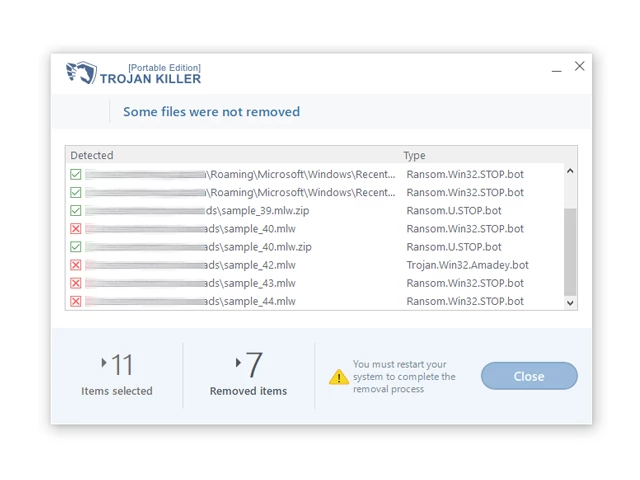
Step 5: Restart Your Computer:
15. Once the threats are removed, click on "Restart PC" to reboot your computer.
16. Remove the USB flash drive from the infected computer.
Congratulations on effectively removing spyware and the concealed threats from your computer! You can now have peace of mind, knowing that they won't resurface again. Thanks to Gridinsoft's capabilities and commitment to cybersecurity, your system is now protected.
Frequently asked questions
The vast majority of information posted on the Coinepex site is false. It is either fabricated, or a manipulation that misses the context of mentioned events. However, things like quotes or other interactive elements related to current prices may be trustworthy. But I would rather avoid using them as a primary source of information.
No, there is no legitimate information on the Coinepex site. The operators of this site use fabricated details and deceptive tactics to create an appearance of credibility, such as appealing visuals and claims of being a licensed company. However, these claims are false, and the site is part of a larger network of interconnected crypto scam sites designed to defraud victims. The scammers manipulate users into providing sensitive personal information and making deposits, ultimately leading to the loss of funds.
Unfortunately, recovering funds lost to a scam like Coinepex can be extremely challenging, if not impossible. Scammers often operate from obscure locations and use various tactics to cover their tracks, making it difficult to trace or retrieve the stolen funds. In many cases, these scams are designed to exploit victims and disappear once they have obtained the money.
Spotting crypto trading scams requires vigilance and a critical eye. Here are some tips to help you identify potential crypto trading scams in the future:
- Question Unrealistic Promises. Approach offers that promise unrealistically high returns or guaranteed profits with caution. If an investment opportunity sounds too good to be true, it probably is.
- Scrutinize Celebrity Endorsements. Exercise skepticism when encountering endorsements from celebrities or public figures. Scammers often create fabricated endorsements to enhance their credibility.
- Verify Regulation and Licensing. Investigate whether the platform or service holds proper regulation and licenses from relevant authorities. Scammers frequently operate without legitimate authorization.
- Consult Reviews and Feedback. Seek out independent reviews and feedback from other traders. Positive reviews can be falsified, but negative reviews may offer valuable insights.
- Resist Urgency. Be wary of tactics that use a false sense of urgency to rush your decisions. Legitimate investments provide the necessary time for thorough research and contemplation.
If you have become a victim of a Coinepex or similar crypto trading scam, it’s important to take immediate action to minimize further damage and increase the chances of recovering your losses. Here’s what you should do:
- Contact Financial Institutions. If you conducted any payments or deposits through your credit card or bank account, promptly notify your financial institution. They might offer assistance in contesting transactions or initiating chargebacks.
- Immediately Halt Communication. Once you recognize that you have fallen victim to a scam, cease all communication with the scammers. Refrain from responding to their emails, messages, or phone calls.
- Consult Legal Counsel. Seek counsel from a legal expert specialized in fraud or financial matters. They can provide guidance on potential legal avenues for recovering your funds.
- Inform the Authorities. Lodge an official report with your local law enforcement agency and relevant regulatory bodies within your country. Present them with the amassed evidence. This step instigates investigations and enhances awareness about the scam.
- Notify Cryptocurrency Exchanges. Should you have employed a cryptocurrency exchange for transactions linked to the scam, inform the exchange about the fraudulent activity. In certain cases, they could extend their assistance.
- Seek Legal Advice. Consult with a legal professional who specializes in fraud or financial matters. They can provide advice on potential legal actions you can take to recover your funds.
- Thoroughly Document the Events. Gather and safeguard all pertinent information, including emails, screenshots, transaction records, and any correspondence with the scammers. This documentation holds utmost importance for reporting the scam and seeking assistance.
The truth about Coinepex

Name: Coinepex
Description: Cryptocurrency scams continue to increase as digital assets achieve mainstream adoption. A recent example of such a scam involves Coinepex, a fraudulent crypto exchange that entices victims with promises of free crypto giveaways. This detailed article will extensively examine the operations of the Coinepex scam, techniques for recognizing it, and, most crucially, ways to evade becoming a victim.
Operating System: All
Application Category: Crypto Scams


